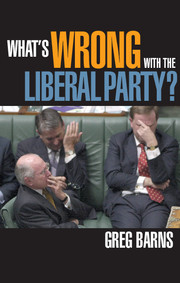Book contents
- Frontmatter
- Contents
- Dedication
- Acknowledgements
- 1 Introduction
- 2 ‘Walking Down the Middle of the Road’
- 3 A Liberal Party Obsession
- 4 Whither the Nationals?
- 5 Assuming One Nation
- 6 The Paradox
- 7 After Howard?
- 8 Meeting the Challenges: Have the Liberals Been Captured?
- 9 So Where To from Here?
- 10 Conclusion
- Endnotes
- Bibliography
- Index
- Frontmatter
- Contents
- Dedication
- Acknowledgements
- 1 Introduction
- 2 ‘Walking Down the Middle of the Road’
- 3 A Liberal Party Obsession
- 4 Whither the Nationals?
- 5 Assuming One Nation
- 6 The Paradox
- 7 After Howard?
- 8 Meeting the Challenges: Have the Liberals Been Captured?
- 9 So Where To from Here?
- 10 Conclusion
- Endnotes
- Bibliography
- Index
Summary
On a warm June day in 2003, sitting in a taxi in Toronto, I strike up a conversation with a Somalian taxi driver. He's a refugee and he's fascinated by global politics. We discuss Australia and Canada, and the conversation turns to political parties. I make the point that John Howard is the leader of the Liberal Party in Australia. This evokes a turn of the head from the taxi driver who says firmly, ‘John Howard's no liberal. Now Jean Chrétien [the Canadian Prime Minister], he's a liberal’. Canada's ruling Liberal Party is indeed liberal – a centre-left party whose policy framework is based on the values of liberalism – equality, fairness and a belief in collective security. Chrétien's government refused to join John Howard, Tony Blair and George Bush in the Coalition of the Willing that invaded Iraq in early 2003. As an aside, Chrétien's decision on this was a good deal more courageous than Howard's, given that 80 percent of Canadian exports go to the US.
But back to the prescient observation of the Somalian taxi driver. He hit the spot – the title of the Liberal Party in Australia is now a total misnomer. There is nothing liberal about the Howard-led party. It is a conservative, arrogant machine that has for the past seven years shown a cavalier disregard for the key tenets of liberalism – freedom of thought and the primacy of human rights.
- Type
- Chapter
- Information
- What's Wrong with the Liberal Party? , pp. 140 - 144Publisher: Cambridge University PressPrint publication year: 2003



